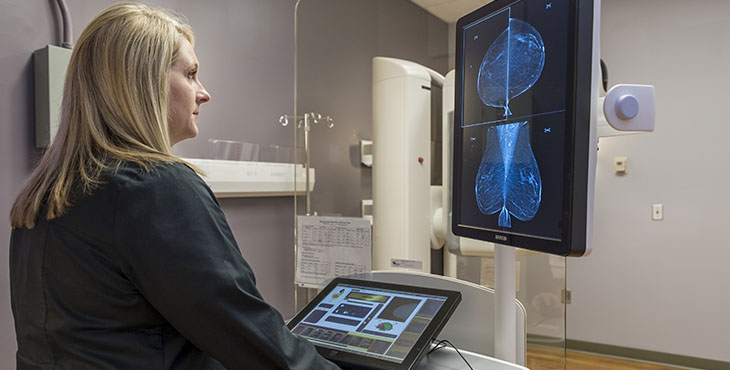
About
After a screening mammogram, you will receive your results in the mail. If anything abnormal is detected on your mammogram, someone from our team will call you to discuss your results. Keep in mind, an abnormal mammogram doesn’t necessarily mean you have breast cancer. It just tells our team that you need additional testing for an accurate diagnosis. If you have an abnormal reading from a screening mammogram, or have signs or symptoms, you will be scheduled for a diagnostic exam.
Additional work-up is sometimes needed to determine the cause of your signs or symptoms, or if findings on the screening mammogram may related to breast cancer. Such tests include additional diagnostic mammograms, ultrasound and biopsy. If additional work-up is needed, one of our breast navigators will contact you. A physician referral is required for these procedures. These exams are not part of the screening procedure and will be billed with the diagnosis code of "abnormal screening mammogram."
If the radiologist remains concerned after the exam, additional tests or a breast biopsy may be recommended and scheduled. We offer diagnostic examinations at our Bearden-Josey Center for Breast Health - Spartanburg and Pelham locations.
Please inquire with your insurance company regarding coverage for any additional work-up.
Diagnostic Breast Imaging Clinic
If you have any signs or symptoms or a recent abnormal screening mammogram, we will refer you to one of two diagnostic breast imaging clinics, located in Spartanburg and Pelham. Our caring team will guide you during this follow-up appointment, perform additional screenings, review your results with you and discuss next steps, if needed.
Upon entering our clinic, you will complete registration and then be escorted to the appropriate exam area. For your comfort, a robe will be provided to wear during the exam.
The technologist will ask you about your breast-related health history and will perform the breast imaging study that was ordered by your referring clinician. Then, while you wait, the technologist will present your case to one of the radiologists.
The radiologist will carefully review your history and imaging studies. Based on this review, we will create an individual plan for you. The plan may include additional views, a breast ultrasound or a breast biopsy.
Your follow-up appointments will be managed by our breast imaging navigators. After the exams and reviews are completed, you will be contacted by phone.
Personal Breast Imaging Navigators
Our team is here for you as you undergo testing. We have two full-time breast imaging navigators on staff. Both navigators are certified mammography technologists who will assist in coordinating your breast imaging care once it has been identified that you have an abnormal mammogram.
They will:
- Answer questions about your results
- Explain recommendations about next steps
- Schedule you for additional appointments, such as a biopsy
Connect you with community or Gibbs Cancer Center resources
Diagnostic Testing
The tests that are run in these clinics include:
Breast Ultrasound
Breast ultrasound is used primarily in conjunction with mammography to evaluate specific problem areas that were identified in a screening. Ultrasound (also called sonography) can often distinguish between a liquid-filled cyst and a solid mass, such as a cancerous tumor.
Breast MRI
Breast MRI uses a magnetic force to evaluate the breast tissue. This test is used for:
- Checking breast implants for leaks or ruptures
- Determining the extent of existing cancer
- Further evaluating areas of concern
- Women at high risk of developing breast cancer
Bearden-Josey Center for Breast Health is one of the only facilities in the region equipped with a 3 Tesla magnetic resonance imaging (MRI) scanner – the most powerful scanners available for clinical use. Because the 3 Tesla is two-to-five-times stronger than a standard MRI, it produces the clearest, most detailed images, so you can count on the most accurate diagnosis.
Image-Guided Breast Biopsy
Image-guided breast biopsy is a non-surgical procedure that uses a needle to remove a small sample of suspicious breast tissue for the pathologist to analyze for the presence of breast cancer.
Needle Localization
Needle localization is a pre-surgical procedure performed under local anesthesia where a wire is inserted into the lesion that will be surgically removed It helps the surgeon accurately remove the suspicious tissue while minimizing the removal of healthy breast tissue.












